2021英语四级考试词组(一)名词类
2021年9月英语四级真题及答案
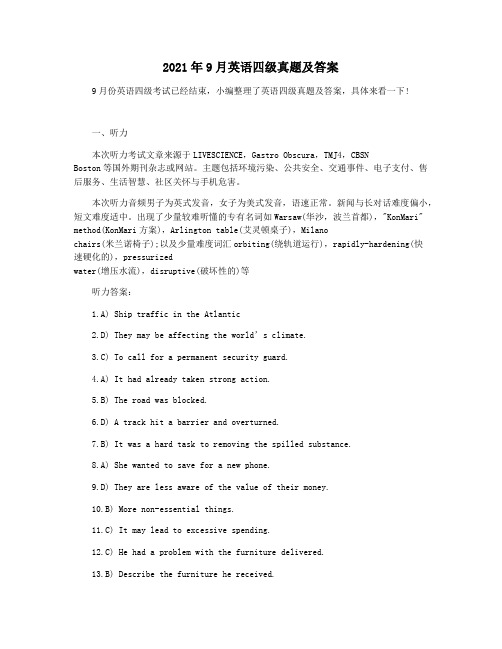
2021年9月英语四级真题及答案9月份英语四级考试已经结束,小编整理了英语四级真题及答案,具体来看一下!一、听力本次听力考试文章来源于LIVESCIENCE,Gastro Obscura,TMJ4,CBSNBoston等国外期刊杂志或网站。
主题包括环境污染、公共安全、交通事件、电子支付、售后服务、生活智慧、社区关怀与手机危害。
本次听力音频男子为英式发音,女子为美式发音,语速正常。
新闻与长对话难度偏小,短文难度适中。
出现了少量较难听懂的专有名词如Warsaw(华沙,波兰首都),"KonMari" method(KonMari方案),Arlington table(艾灵顿桌子),Milanochairs(米兰诺椅子);以及少量难度词汇orbiting(绕轨道运行),rapidly-hardening(快速硬化的),pressurizedwater(增压水流),disruptive(破坏性的)等听力答案:1.A) Ship traffic in the Atlantic2.D) They may be affecting the world’s climate.3.C) To call for a permanent security guard.4.A) It had already taken strong action.5.B) The road was blocked.6.D) A track hit a barrier and overturned.7.B) It was a hard task to removing the spilled substance.8.A) She wanted to save for a new phone.9.D) They are less aware of the value of their money.10.B) More non-essential things.11.C) It may lead to excessive spending.12.C) He had a problem with the furniture delivered.13.B) Describe the furniture he received.14.A) Correct their mistake.15. C) She apologized to the man once more.16. B) Tidying up one's home.17. A) Things that make one happy.18. C) It received an incredibly large number of donated books.19. A) Give free meals to the homeless.20. D) Follow his example.21. C) Sending him had-made bags.22. A) To solve word search puzzles.23. B) They could no longer concentrate on their task.24. C) A reduction in the amount of sleep.25. C) Realize the disruptive effects of technology.主要出题点如下:1. 文章开头。
大学英语四级考试的考点有哪些知识点汇总
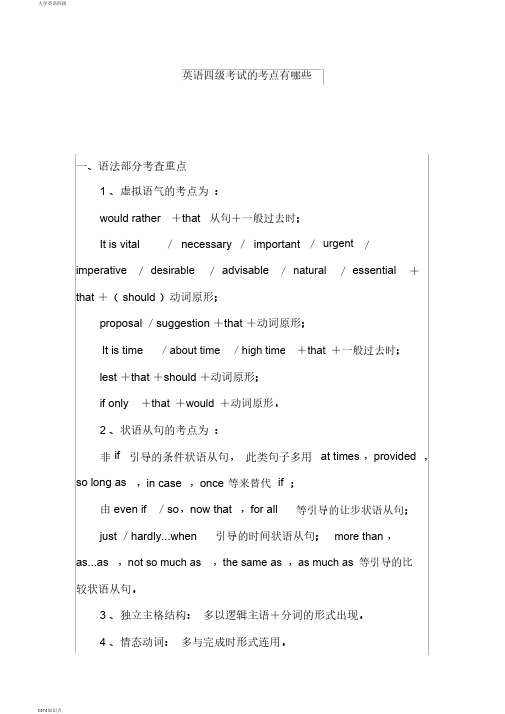
英语四级考试的考点有哪些一、语法部分考查重点1 、虚拟语气的考点为:would rather+that从句+一般过去时;It is vital/necessary/important/urgent /imperative /desirable /advisable /natural /essential +that +( should )动词原形;proposal /suggestion +that +动词原形;It is time/about time/high time+that+一般过去时;lest +that +should +动词原形;if only+that+would+动词原形。
2 、状语从句的考点为:非if 引导的条件状语从句,此类句子多用at times ,provided ,so long as ,in case ,once 等来替代if ;由 even if /so,now that ,for all 等引导的让步状语从句;just /hardly...when引导的时间状语从句;more than ,as...as,not so much as,the same as,as much as等引导的比较状语从句。
3 、独立主格结构:多以逻辑主语+分词的形式出现。
4 、情态动词:多与完成时形式连用。
5、定语从句:重点考查介词+关系代词(which)和 as 作为关系代词。
二、词汇部分考查重点1、动词、名词与介词的搭配如: popular /patient +with ;yield /s olution /adapt /transfer /access +to ;accuse/require +of ;charge +for ;under +discussion等等。
2、习惯用法如: confess to /set about /be used to +doing ;be supposed to /have/make sb.+ do 等。
2021年6月大学英语四级考试真题(第一套)

2021年6月大学英语四级考试真题(第一套)答案请戳:2021年6月四级真题答案发布【试卷一】(xx网校版)Part I Writing(30 minutes)Directions: For this part, you are allowed 30 minutes to write an essay based on the picture below.You should start your essay with a brief description of the picture and then comment on the kid's understanding of going to school.You should write at least 120 words but no more than 180 words.Part II Listening Comprehension(30 minutes)听力音频地址:/attached/media/20211113/20211113103125_157 5.mp3Section ADirections : In this section, you will hear 8 short conversations and 2 long conversations.At the end ofeach conversation, one or more questions will be asked about what was said.Both theconversation and the questions will be spoken only once.After each question there will bea pause.During the pause, you must read the four choices marked A., B), C.and D),and decide which is the best answer.Then mark the corresponding letter on AnswerSheet 1 with a single line through thecentre.1.A.He will give the woman some tips on the game.B.The woman has good reason to quit the game.C.He is willing to play chess with the woman.D.The woman should go on playing chess.2.A.The man can forward the mail to Mary.B.She can call Mary to take care of the mail.C.Mary probably knows Sally's new address.D.She would like to resume contact with Sally.3.A.His handwriting has a unique style.B.His notes are not easy to read.C.He did not attend today's class.D.He is very pleased to be able to help.4.A.The man had better choose another restaurant.B.The new restaurant is a perfect place for dating.C.The new restaurant caught her fancy immediately.D.The man has good taste in choosing the restaurant.5.A.He has been looking forward to spring.B.He has been waiting for the winter sale.C.He will clean the woman's boots for spring.D.He will help the woman put things away.6.A.The woman is rather forgetful.B.The man appreciates the woman's help.C.The man often lends books to the woman.D.The woman often works overtime at weekends.7.A.Go to work on foot.B.Take a sightseeing trip.C.Start work earlier than usual.D.Take a walk when the weather is nice.8.A.The plane is going to land at another airport.B.All flights have been delayed due to bad weather.C.Temporary closing has disturbed the airport's operation.D.The airport's management is in real need of improvement. Questions 9 to 12 are based on the conversation you have just heard.9.A.It specializes in safety from leaks.B.It is headquartered in London.C.It has a partnership with LCP.D.It has a chemical processing plant.10.A.He is Mr.Grand's friend.B.He is a safety inspector.C.He is a salesman.D.He is a chemist.11.A.Director of the safety department.B.Mr.Grand's personal assistant.C.Head of the personnel department.D.The public relations officer.12. A.Walt for Mr.Grand to call back.B.Leave a message for Mr.Grand.C.Provide details of their products and services.D.Send a comprehensive description of their work.Questions 13 to 15 are based on the conversation you have just heard.13.A.She learned playing the violin from a famous French musician.B.She dreamed of working and living in a European country.C.She read a lot about European musicians and their music.D.She listened to recordings of many European orchestras.14.A.She began taking violin lessons as a small child.B.She was a pupil of a famous European violinist.C.She gave her first performance with her father.D.She became a professional violinist at fifteen.15.A.It gave her a chance to explore the city.B.It was the chance of a lifetime.C.It was a great challenge to her.D.It helped her learn classical French music.Section BDirections: In this section, you will hear 3 short passages.At the end of each passage, you will hearsome questions.Both the passage and the questions will be spoken only once.After youhear a question, you must choose the best answer from the four choices marked A., B),C.and D ).Then mark the corresponding letter on Answer Sheet 1 with a single linethrough the centre.Passage OneQuestions 16 to 18 are based on the passage you have just heard.16.A.There are mysterious stories behind his works.B.There are many misunderstandings about him.C.His works have no match worldwide.D.His personal history is little known.17.A.He moved to Stratford-on-Avon in his childhood.B.He failed to go beyond grammar school.C.He was a member of the town council.D.He once worked in a well-known acting company.18. A.Writers of his time had no means to protect their works.B.Possible sources of clues about him were lost in a fire.C.His works were adapted beyond recognition.D.People of his time had little interest in him.Passage TwoQuestions 19 to 21 are based on the passage you have just heard.19. A.Theft.B.Cheating.C.Air crash.D.Road accidents.20. A.Learn the local customs.B.Make hotel reservations.C.Book tickets well in advance.D.Have the right documents.21.A.Contact your agent.B.Get a lift if possible.e official transport.D.Have a friend meet you.Passage ThreeQuestions 22 to 25 are based on the passage you have just heard.22.A.Cut down production cost.B.Sell inexpensive products.C.Specialise in gold ornaments.D.Refine the taste of his goods.23.A.At a national press conference.B.During a live television interview.C.During a local sales promotion campaign.D.At a meeting of top British businesspeople.24.A.Insulted.B.Puzzled.C.Distressed.D.Discouraged.25.A.The words of some businesspeople are just rubbish.B.He who never learns from the past is bound to fail.C.There should be a limit to one's sense of humour.D.He is not laughed at, that laughs at himself first.Section CDirections: In this section, you will hear a passage three times.When the passage is read for the firsttime, you should listen carefully for its general idea.When the passage is read for thesecond time, you are required tofill in the blanks with the exact words you have justheard.Finally, when the passage is read for the third time, you should check what youhave written.Looking at the basic biological systems, the world is not doing very well.Yet economic indicators show the world is 26 Despite a slow start at the beginning of the eighties, global economic output increased by more than a fifth during the 27 The economy grew, trade increased, and millions of new jobs were created.How can biological indicators show the 28 of economic indicators?The answer is that the economic indicators have a basic fault: they show no difference between resource uses that 29 progress and those uses that will hurt it.The main measure of economic progress is the gross national product (GNP). 30 , this totals the value of all goods and services produced and subtracts loss in value of factories and equipment.Developed a half-century ago, GNP helped 31 a common way among countries of measuring change in economic output.For some time, this seemed to work 32 well, but serious weaknesses are now appearing.As indicated earlier, GNP includes loss in value of factories and equipment, but it does not 33 the loss of natural resources, including nonrenewable resources such as oil or renewable resources such asforests.This basic fault can produce a 34 sense of national economic health.According to GNP, for example, countries that overcut forests actually do better than those that preserve their forests.The trees cut down are counted as income but no subtraction is made for 35 the forests.Part ⅢReading Comprehension ( 40 minutes)Section ADirections: In this section, there is a passage with ten blanks.You are required to select one word foreach blank from a list of choices given in a word bank following the passage.Read the passage through carefully before making your choices.Each choice in the bank is identified by a letter.Please mark the corresponding letter for each item on Answer Sheet2 with a single line through the centre.You may not use any of the words in the bank more than once.Questions 36 to 45 are based on the following passage.The U.S.Department of Education is making efforts to ensure that all students have equal access to a quality education.Today it is 36 the launch of the Excellent Educators for All Initiative.The initiative will helpstates and school districts support great educators for the students who need them most."All children are 37 to a high-quality education regardless of their race, zip code or family income.It is 38 important that we provide teachers and principals the support they need to help students reach their full 39 ," U.S.Secretary of Education Arne Duncan said." Despite the excellent work and deep 40 of our nation's teachers and principals, students in high-poverty, high- minority schools are unfairly treated across our country.We have to do better.Local leaders and educators will 41 their own creative solutions, but we must work together to 42 our focus on how to better recruit, support and 43 effective teachers and principals for all students, especially the kids who need them most."Today's announcement is another important step forward in improving access to a quality education, a 44 of President Obama's year of ter today, Secretary Duncan will lead a roundtable discussion with principals and school teachers from across the country about the 45 of working in high-need schools and how to adopt promising practices for supporting great educators in these schools.A.AnnouncingB.beneficialC.challengesmitmentponentF.contestsG.criticallyH.developI.distributingJ.enhanceK.entitledL.potentialM.properlyN.qualifiedO.retainSection BDirections: In this section, you are going to read a passage with ten statements attached to it.Eachstatement contains information given in one of the paragraphs.Identify the paragraph from which the information is derived.You may choose a paragraph more than once.Each paragraph is marked with a letter.Answer the questions by marking thecorresponding letter on Answer Sheet 2.The Changes Facing Fast FoodA.Fast-food firms have to be a thick-skinned bunch.Health experts regularly criticise them severelyfor selling food that makes people fat.Critics even complain that McDonald's, whose logosymbolises calorie excess, should not have been allowed to sponsor the World Cup.These arethings fast-food firms have learnt to cope with.But not perhaps for much longer.The burgerbusiness faces more pressure from regulators at a time when it is already adapting strategies inresponse to shifts in the global economy.B)Fast food was once thought to be recession-proof.When consumers need to cut spending, the logicgoes, cheap meals like Big Macs and Whoppers become even more attractive.Such "trading down"proved true for much of the latest recession, when fast-food companies picked up customers who could no longer afford to eat at casual restaurants.Traffic was boosted in America, the home of fast food, with discounts and promotions, such as $1 menus and cheap combination meals.C)As a result, fast-food chains have weathered the recession better than their more expensive competitors.In 2020 sales at full-service restaurants in America fell by more than 6% , but total sales remained about thesame at fast-food chains.In some markets, such as Japan, France and Britain, total spending on fast food increased.Same-store sales in America at McDonald's, the world's largest fast-food company, did not decline throughout the downturn.Panera Bread, an American fast-food chain known for its fresh ingredients, performed well, too, because it offers higher-quality food at lower prices than restaurants.D)But not all fast-food companies have been as fortunate.Many, such as Burger King, have seen sales fall.In a severe recession, while some people trade down to fast food, many others eat at home more frequently to save money.David Palmer, an analyst at UBS, a bank, says smaller fast- food chains in America, such as Jack in the Box and Carl's Jr., have been hit particularly hard in this downturn because they are competing with the global giant McDonald's, which increased spending on advertising by more than 7% last year as others cut back.E.Some fast-food companies also sacrificed their own profits by trying to give customers better value.During the recession companies set prices low, hoping that once they had tempted customers through the door they would be persuaded to order more expensive items.But in many cases that strategy did not st year Burger King franchisees (特许经营人)sued (起诉)the company over its double-cheeseburgerpromotion, claiming it was unfair for them to be repuired to sell these for $1 when they cost$1.10 to make.In May a judge ruled in favour of Burger King.Nevertheless, the company may still be cursing its decision to promote cheap choices over more expensive ones because items on its "value menu" now account for around 20% of all sales, upfrom 12% last October.F.Analysts expect the fast-food industry to grow modestly this year.But the downturn is makingcompanies rethink their strategies.Many are now introducing higher-priced items to entice (引诱)consumers away from $1 specials.KFC, a division of Yum! Brands, which also owns Taco Belland Pizza Hut, has launched a chicken sandwich that costs around $5.And in May Burger Kingintroduced barbecue (烧烤)pork ribs at $7 for eight.panies are also trying to get customers to buy new and more items, including drinks.McDonald's started selling better coffee as a challenge to Starbucks.Its " McCafe" line nowaccounts for an estimated 6% of sales in America.Starbucks has sold rights to its Seattle's Bestcoffee brand to Burger King, which will start selling it later this year.H.As fast-food companies shift from "super size" to "more buys", they need to keep customer traffichigh throughout the day.Many see breakfast as a big opporttmity, and not just for fatty food.McDonald's willstart selling porridge (粥)in America next year.Breakfast has the potential to bevery profitable, says Sara Senatore of Bernstein, a research firm, because the margins can be high.Fast-food companies are also adding midday and late-night snacks, such as blended drinks andwraps.The idea is that by having a greater range of things on the menu, "we can sell to consumersproducts they want all day," says Rick Carucci., the .chief financial officer of Yum ! Brands.I.But what about those growing waistlines? So far, fast-food firms have cleverly avoided governmentregulation.By providing healthy options, like salads and low-calorie sandwiches, they have at leastgiven the impression of doing something about helping to fight obesity (肥胖症).These offeringsare not necessarily loss-leaders, as they broaden the appeal of outlets to groups of diners thatinclude some people who don't want to eat a burger.But customers cannot be forced to ordersalads instead of fries.J.In the future, simply offering a healthy option may not be good enough."Every packaged-food and restaurant company I know is concerned about regulation right now," says Mr.Palmer of UBS.America's health-reform bill, which Congress passed this year, requires restaurant chains with 20 ormore outlets to put the calorie-content of items theyserve on the menu.A study by the NationalBureau of Economic Research, which tracked the effects on Starbucks of a similar calorie-postinglaw in New York City in 2007, found that the average calorie-count per transaction fell 6% andrevenue increased 3% at Starbucks stores where a Dunldn Donuts outlet was nearby--a sign, it issaid, that menu-labelling could favour chains that have more healthy offerings.K.In order to avoid other legislation in America and elsewhere, fast-food companies will have tocontinue innovating (创新).Walt Riker of McDonald's claims the change it has made in its menumeans it offers more healthy items than it did a few years ago."We probably sell more vegetables,more milk, more salads, more apples than any restaurant business in the world," he says.But therecent proposal by a county in California to ban McDonald's from including toys in its high-calorie"Happy Meals", because legislators believe it attracts children to unhealthy food, suggests there isa lot more left to do.46.Some people propose laws be made to stop McDonald's from attaching toys to its food specials for children.47.Fast-food finns may not be able to cope with pressures from food regulation in the near future.48.Burger King will start to sell Seattle's Best coffee to increase sales.49.Some fast-food firms provide healthy food to give the impression they are helping to tackle the obesity problem.50.During the recession, many customers turned to fast food to save money.51.Many people eat out less often to save money in times of recession.52.During the recession, Burger King's promotional strategy of offering low-priced items often proved ineffective.53.Fast-food restaurants can make a lot of money by selling breakfast.54.Many fast-food companies now expect to increase their revenue by introducing higher-priced items.55.A newly-passed law asks big fast-food chains to specify the calorie count of what they serve on the menu.Section CDirections: There are 2 passages in this section.Each passage is followed by some questions orunfinished statements.For each of them there are four choices marked A., B), C.andD ).You should decide on the best choice and mark the corresponding letter on AnswerSheet 2 with a single line through the centre.Passage OneQuestions 56 to 60 are based on the following passage.If you think a high-factor sunscreen (防晒霜)keeps you safe from harmful rays, you may be wrong.Research in this week's Nature shows that while factor 50 reduces the number of melanomas(黑瘤)and delays their occurrence, it can't prevent them.Melanomas are the most aggressive skin cancers.You have a higher risk if you have red or blond hair, fair skin, blue or green eyes, or sunburn easily, or if a close relative has had one.Melanomas are more common if you have periodic intense exposure to the sun.Other skin cancers are increasingly likely with long-term exposure.There is continuing debate as to how effective sunscreen is in reducing melanomas the evidence is weaker than it is for preventing other types of skin cancer.A 2020 Australian study of 1,621 people found that people randomly selected to apply sunscreen daily had half the rate of melanomas of people who used cream as needed.A second study, comparing 1,167 people with melanomas to 1,101 who didn't have the cancer, found that using sunscreen routinely, alongside other protection such as hats,long sleeves or staying in the shade, did give some protection.This study said other forms of sun protection not sunscreen seemed most beneficial.The study relied on people remembering what they had done over each decade of their lives, so it's not entirelyreliable.But it seems reasonable to think sunscreen gives people a false sense of security in the sun.Many people also don't use sunscreen properly applying insufficient amounts, failing to reapply after a couple of hours and staying in the sun too long.It is sunburn that is most worrying recent research shows five episodes of sunburn in the teenage years increases the risk of all skin cancers.The good news is that a combination of sunscreen and covering up can reduce melanoma rates, as shown by Australian figures from their slip-slop-slap campaign.So if there is a heat wave this summer, it would be best for us, too, to slip on a shirt, slop on (抹上)sunscreen and slap ona hat.56.What is people's common expectation of a high-factor sunscreen?A.It will delay the occurrence of skin cancer.B.It will protect them from sunburn.C.It will keep their skin smooth and fair.D.It will work for people of any skin color.57.What does the research in Nature say about a high-factor sunscreen?A.It is ineffective in preventing melanomas.B.It is ineffective in case of intense sunlight.C.It is ineffective with long-term exposure.D.It is ineffective for people with fair skin.58.What do we learn from the 2020 Australian study of 1,621 people?A.Sunscreen should be applied alongside other protection measures.B.High-risk people benefit the most from the application of sunscreen.C.Irregular application of sunscreen does women more harm than good.D.Daily application of sunscreen helps reduce the incidence of melanomas.59.What does the author say about the second Australian study?A.It misleads people to rely on sunscreen for protection.B.It helps people to select the most effective sunscreen.C.It is not based on direct observation of the subjects.D.It confirms the results of the first Australian study.60.What does the author suggest to reduce melanoma rates?ing both covering up and sunscreen.B.Staying in the shade whenever possible.ing covering up instead of sunscreen.D.Applying the right amount of sunscreen.Passage TwoQuestions 61 to 65 are based on the following passage.Across the rich world, well-educated people increasingly work longer than the less-skilled.Some65% of American men aged 62 -74 with a professional degree are in the workforce, compared with32% of men with only a high-school certificate.This gap is part of a deepening divide between the well-educated well-off and the unskilled poor.Rapid technological advance has raised the incomes of the highly skilled while squeezing those of the unskilled.The consequences, for individuals and society, are profound.The world is facing an astonishing rise in the number of old people, and they will live longer than ever before.Over the next 20 years the global population of those aged 65 or more will almost double, from 600 million to 1.1 billion.The experience of the 20th century, when greater longevity (长寿)translated into more years in retirement rather than more years at work, has persuaded many observers that this shift will lead to slower economic growth, while the swelling ranks of pensioners will create government budget problems.But the notion of a sharp division between the working young and the idle old misses a new trend, the growing gap between the skilled and the unskilled.Employment rates are falling among younger unskilled people, whereas older skilled folk are working longer.The divide is most extremein America, where well-educated baby-boomers (二战后生育高峰期出生的美国人)are putting off retirement while many less-skilled younger people have dropped out of the workforce.Policy is partly responsible.Many European governments have abandoned policies that used to encourage people to retire early.Rising life expectancy (预期寿命), combined with the replacement of generous defmed-benefit pension plans with less generous defined-contribution ones, means that even the better-off must work longer to have a comfortable retirement.But the changing nature of work also plays a big role.Pay has risen sharply for the highly educated, and those people continue to reap rich rewards into old age because these days the educated elderly are more productive than the preceding generation.Technological change may well reinforce that shift: the skills that complement computers, from management knowhow to creativity, do not necessarily decline with age.61.What is happening in the workforce in rich countries?A.Younger people are replacing the elderly.B.Well-educated people tend to work longer.C.Unemployment rates are rising year after year.D.People with no college degree do not easily find work.62.What has helped deepen the divide between the well-off and the poor?A.Longer life expectancies.B.A rapid technological advance.C.Profound changes in the workforce.D.A growing number of the well-educated.63.What do many observers predict in view of the experience of the 20th century?A.Economic growth will slow down.ernment budgets will increase.C.More people will try to pursue higher education.D.There will be more competition in the job market.64.What is the result of policy changes in European countries?A.Unskilled workers may choose to retire early.B.More people have to receive in-service training.C.Even wealthy people must work longer to live comfortably in retirement.D.People may be able to enjoy generous defined-benefits from pension plans.65.What is characteristic of work in the 21st century?puters will do more complicated work.B.More will be taken by the educated young.C.Most jobs to be done will be the creative ones.D.Skills are highly valued regardless of age.Part ⅣTranslation ( 30 minutes)Directions: For this part, you are allowed 30 minutes to translate a passage from Chinese into English.You should write your answer on Answer Sheet 2.中国是世界上最古老的文明之一。
英语四级考试高频词组
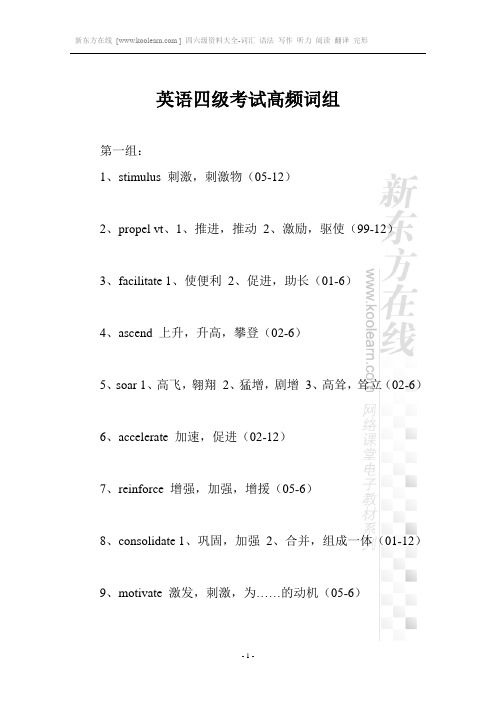
英语四级考试高频词组第一组:1、stimulus 刺激,刺激物(05-12)2、propel vt、1、推进,推动2、激励,驱使(99-12)3、facilitate 1、使便利2、促进,助长(01-6)4、ascend 上升,升高,攀登(02-6)5、soar 1、高飞,翱翔2、猛增,剧增3、高耸,耸立(02-6)6、accelerate 加速,促进(02-12)7、reinforce 增强,加强,增援(05-6)8、consolidate 1、巩固,加强2、合并,组成一体(01-12)9、motivate 激发,刺激,为……的动机(05-6)10、induce 劝诱,促使,导致(04-12)11、amplify 1、增强,放大2、详尽说明(04-12)12、magnify 1、放大,扩大2、夸张,夸大(04-12)13、elaborate 详尽的(03-9)14、tempted 1、引诱,诱导2、吸引(04-6)15、boom 激增,繁荣(04-6)16、consensus 意见一致(04-12)17、overlap 与……重叠,交叠(00-6)18、collaboration 1、合作,协作2、勾结,通敌(02-12)19、accommodate 1、容纳,接纳2、向……提供住处3、使适应,符合一致(05-6)20、gear 调整,适应(00-6)21、cumulative 渐增的,累积的(01-12)22、identical 同一的,恒等的,完全相同的(01-6)23、immovable 固定的,不动的(01-6)24、homogenous 同种,同质的,均匀的(02-6)25、mediate 1、调停,调解2、传达,转交(03-12)26、transaction 交易,办理,执行,和解(03-12)27、contribute vt、1、捐献,捐助,贡献2、投稿vi、1、贡献,捐献2、促成,有利于(03-9)28、subscribe 1、签署2、认捐,捐助(01-6)29、dedicate 以……奉献;把(时间、精力),把(自己、一生)献给(01-12)30、endow 1、捐助,捐赠2、给予,赋予(01-12)第二组:1、stretch vt、伸长;拉长;使倾注全力,使紧张vi、伸展,延绵,伸懒腰(99-12)2、jerked 猛拉(02-12)3、unfold vi、伸展,呈现vt、打开,显露,开展(03-6)4、radiate 1、发射,放射,辐射2、流露,显示(03-12)5、manifest vt、表明,证明vi、显示,出现a、显然的,明白的(04-6)6、conspicuous 明显的,显眼的(01-6)7、bald 光秃的,明显的(04-6)8、elicit 探出,引出(03-9)9、distinction 差别,区别,级别,特性,显赫,优秀,杰出(04-6)10、ingenious 1、设计独特的,别致的2、灵巧的,机敏的,善于发明创造的(04-12)11、exceptionally 例外的,异常的,罕见的,特殊的,突出的(03-6)12、glitter 闪闪发光的,灿烂,闪烁(02-12)第三组:1、perpetual 1、持久的,永久的2、没完没了的(03-6)2、invariably 恒定的,不变的,始终如一的,总是(03-6)3、ingredient 1、成分,原料2、要素,因素(00-12)4、essence 1、本质。
英语四级4000必考词汇有哪些?有哪些必背短语搭配
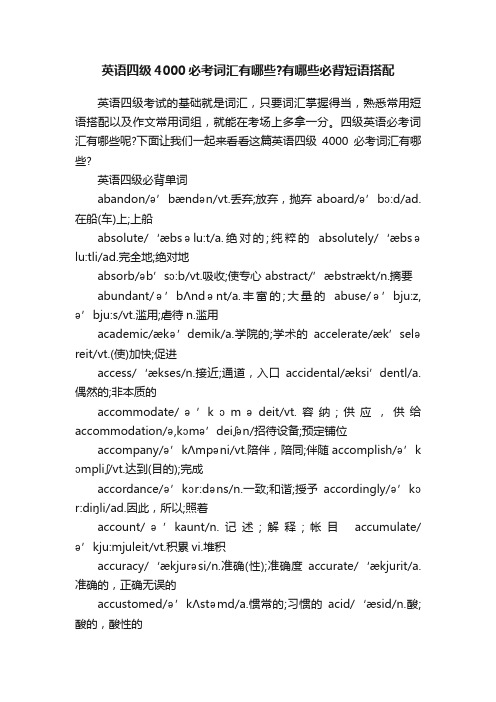
英语四级4000必考词汇有哪些?有哪些必背短语搭配英语四级考试的基础就是词汇,只要词汇掌握得当,熟悉常用短语搭配以及作文常用词组,就能在考场上多拿一分。
四级英语必考词汇有哪些呢?下面让我们一起来看看这篇英语四级4000必考词汇有哪些?英语四级必背单词abandon/ə’bændən/vt.丢弃;放弃,抛弃 aboard/ə’bɔ:d/ad.在船(车)上;上船absolute/‘æbsəlu:t/a.绝对的;纯粹的absolutely/‘æbsəlu:tli/ad.完全地;绝对地absorb/əb’sɔ:b/vt.吸收;使专心abstract/’æbstrækt/n.摘要abundant/ə’bΛndənt/a.丰富的;大量的abuse/ə’bju:z,ə’bju:s/vt.滥用;虐待n.滥用academic/ækə’demik/a.学院的;学术的accelerate/æk’seləreit/vt.(使)加快;促进access/‘ækses/n.接近;通道,入口accidental/æksi’dentl/a.偶然的;非本质的accommodate/ə’kɔmədeit/vt.容纳;供应,供给accommodation/ə,kɔmə’deiʃən/招待设备;预定铺位accompany/ə’kΛmpəni/vt.陪伴,陪同;伴随 accomplish/ə’k ɔmpliʃ/vt.达到(目的);完成accordance/ə’kɔr:dəns/n.一致;和谐;授予accordingly/ə’kɔr:diŋli/ad.因此,所以;照着account/ə’kaunt/n.记述;解释;帐目accumulate/ə’kju:mjuleit/vt.积累vi.堆积accuracy/‘ækjurəsi/n.准确(性);准确度accurate/‘ækjurit/a.准确的,正确无误的accustomed/ə’kΛstəmd/a.惯常的;习惯的acid/‘æsid/n.酸;酸的,酸性的acquaintance/ə’kweintəns/n.认识;了解;熟人acquire/ə’kwaiə/vt.取得;获得;学到acre/‘eikə/n.英亩(=6.07亩) adapt/ə’dæpt/vt.使适应;改编addition/ə’diʃən/n.加,加法;附加物 additional/ə’diʃənl/a.附加的,追加的address/ə’dres/n.地址;演说;谈吐adequate/‘ædikwit/a.足够的;可以胜任的adjust/ə’dʒΛst/vt.调整,调节;校正administration/ədminis’treiʃən/n.管理;管理部门admission/əd’miʃən/n.允许进入;承认 admit/əd’mit/vt.承认;准许…进入advance/əd’va:ns/vi.前进;提高n.进展advanced/əd’va:nst/a.先进的;高级的adventure/əd’ventʃə/n.冒险;惊险活动advisable/əd’vaizəbl/n.明智的;可取的affair/ə’feə/n.事情,事件;事务 affect/ə’fekt/vt.影响;感动affection/ə’fekʃən/n.慈爱,爱;爱慕 afford/ə’fɔr:d/vt.担负得起…;提供afterward/‘a:ftəwəd(z)/ad.后来,以后 age/eidʒ/vt.变老aggressive/ə’gresiv/a.侵略的;好斗的aircraft/‘eəkra:ft/n.飞机,飞行器alarm/ə’la:m/n.惊恐,忧虑;警报alcohol/‘ælkəhɔl/n.酒精,乙醇alike/ə’laik/a.同样的,相同的alloy/‘ælɔi,ə’lɔi/n.合金;(金属的)成色alphabet/‘ælfəbit/n.字母表,字母系统alter/‘ɔ:ltə/vt.改变,变更;改做alternative/ɔ:l’tə:nətiv/n.替换物;取舍,抉择altitude/‘æltitju:d/n.高,高度;高处aluminium/ælju’minjəm/n.铝 amaze/ə’meiz/vt.使惊奇,使惊愕ambulance/‘æmbjuləns/n.救护车;野战医院amongst/ə’mΛŋst/prep在…之中(=among)amuse/ə’mju:z/vt.逗…乐;给…娱乐analyse/‘ænəlaiz/vt.分析,分解,解析analysis/ə’næləsis/n.分析,分解,解析ancestor/‘ænsistə/n.祖宗,祖先anchor/‘æŋkə/n.锚vi.抛锚,停泊ancient/‘einʃənt/a.古代的,古老的ankle/‘æŋkl/n.踝,踝节部announce/ə’nauns/vt.宣布,宣告,发表annoy/ə’nɔi/vt.使恼怒;打搅annual/‘ænjuəl/a.每年的n.年报anticipate/æn’tisipeit/vt.预料,预期,期望anxiety/æŋg’zaiəti/n.焦虑,忧虑;渴望anxious/‘æŋkʃəs/a.忧虑的;渴望的 apart/ə’pa:t/ad.相隔;分开;除去apologize/ə’pɔlədʒaiz/vi.道歉,谢罪,认错apparatus/,æp ə’reitəs/n.器械,仪器;器官appeal/ə’pi:l/vi.&n.呼吁;申述appetite/‘æpitait/n.食欲,胃口;欲望appliance/ə’plaiəns/n.用具,器具,器械applicable/‘æplik əbl/a.能应用的;适当的application/æpli’keiʃən/n.请求,申请;施用appɔint/ə’pɔint/vt.任命,委任;约定appreciate/ə’pri:ʃieit/vt.欣赏;领会;感谢approval/ə’pru:vəl/n.赞成,同意;批准approve/ə’pru:v/vt.赞成,称许;批准approximate/ə’prɔksimit/a.近似的vt.近似arbitrary/‘a:bitrəri/a.随心所欲的;专断的architecture/‘a:kitektʃə/n.建筑学;建筑式样argue/‘a:gju:/vi.争论,争辩,辩论argument/‘a:gju:mənt/n.争论,辩论;理由arise/ə’raiz/vi.出现;由…引起arithmetic/ə’riθmətik/n.算术,四则运算arouse/ə’rauz/vt.引起,唤起;唤醒article/‘a:tikl/n.条款;物品artificial/a:ti’fiʃəl/a.人工的;娇揉造作的artistic/a:’tistik/a.艺术的;艺术家的ash/æʃ/n.灰,灰末;骨灰ashamed/ə’ʃeimd/a.惭愧(的);羞耻(的) aspect/‘æspekt/n.方面;样子,外表 assemble/ə’sembl/vt.集合,召集;装配assembly/ə’sembli/n.集合;集会;装配assess/ə’ses/vt.对(财产等)估价assign/ə’sain/vt.指派;分配;指定assist/ə’sist/vt.援助,帮助;搀扶assistance/ə’sistəns/n.协助,援助associate/ə’səuʃieit/vi.交往n.伙伴,同事association/əsəusi’eiʃən/n.协会,团体;联合assume/ə’sju:m/vt.假定;承担;呈现assure/ə’ʃuə/vt.使确信;向…保证astonish/əs’tɔniʃ/vt.使惊讶,使吃惊astronaut/‘æstʃəunɔ:t/n.宇宙航行员,宇航员atlantic/ət’læntik/a.大西洋的n.大西洋atom/‘ætəm/n.原子;微粒;微量atomic/ə’tɔmik/a.原子的;原子能的attach/ə’tætʃ/vt.缚,系,贴;附加attain/’tein/vt.达到,获得,完成attempt/ə’tempt/vt.尝试,试图n.企图attend/ə’tend/vt.出席;照顾,护理attribute/‘ætribju:t/vt.把…归因于n.属性audience/‘ɔ:djəns/n.听众,观众,读者authority/ɔ:’θɔriti/n.当局,官方;权力automatic/ɔ:t ə’mætik/a.自动的;机械的automobile/‘ɔ:təməbi:l/n.汽车,机动车auxiliary/ɔ:g’ziljəri/a.辅助的;附属的available/ə’veiləbl/a.可利用的;通用的avenue/‘ævinju:/n.林荫道,道路;大街await/ə’weit/vt.等候,期待 awake/ə’weik/a.醒着的vt.唤醒award/ə’wɔ:d/n.奖,奖品;判定aware/ə’weə/a.知道的,意识到的awful/‘ɔ:ful/a.令人不愉快的awkward/‘ɔ:kwəd/a.笨拙的;尴尬的ax/æks/n.斧子英语四级常用短语搭配1.in the long run 从长远来看,最后2.on offer 在出售中3.choose from... 从...中挑选4.be curious about... 对...感到好奇5.confront with... 使面临, 使面对6.with interest 有兴趣地7.an average of ... 平均是...8.at high altitudes 在很高的地方9.draw one’s attention 吸引某人的注意10.focus on 集中11.in years to come 在未来的几年内12.as a matter of fact 实际上13.adopt a positive approach 采取一种正确的方法14.wait for 等待15.pass through 经过, 通过16.a sequence of 一系列的17.set apart from 把...区分开18.take ... for granted 以...为骄傲19.be aware of/that 注意到20.translate into 翻译成21.set in 开始22.intend to do 想要做23.looking forward to 期望24.be built from... 用...去建造25.a wide variety of 很多的26.at advanced levels 在高级范围内27.carry out 完成,实施28.according to 根据29.aim to do 指望做某事30.make sacrifices to do 做出牺牲而做31.in depth 深入地32.a series of 一系列,一连串33.above all 首先,尤其是34.after all 毕竟,究竟35.ahead of 在...之前36.ahead of time 提前37.all at once 突然,同时38.all but 几乎;除了...都39.all of a sudden 突然40.all over 遍及41.all over again 再一次,重新42.all the time 一直,始终43.all the same 仍然,照样的44.as regards 关于,至于45.anything but 根本不46.as a matter of fact 实际上47.apart from 除...外(有/无)48.as a rule 通常,照例49.as a result(of) 因此,由于50.as far as ...be concerned 就...而言51.as far as 远至,到...程度52.as for 至于,关于53.as follows 如下54.as if 好像,仿怫55.as good as 和...几乎一样56.as usual 像平常一样,照例57.as to 至于,关于58.all right 令人满意的;可以59.as well 同样,也,还60.as well as 除...外(也),即...又61.aside from 除...外(还有)62.at a loss 茫然,不知所措63.at a time 一次,每次64.at all 丝毫(不),一点也不65.at all costs 不惜一切代价66.at all events 不管怎样,无论如何67.at all times 随时,总是68.at any rate 无论如何,至少69.at best 充其量,至多70.at first 最初,起先71.at first sight 乍一看,初看起来72.at hand 在手边,在附近73.at heart 内心里,本质上74.at home 在家,在国内75.at intervals 不时,每隔...76.at large 大多数,未被捕获的77.at least 至少78.at last 终于79.at length 最终,终于80.at most 至多,不超过81.at no time 从不,决不82.by accident 偶然83.at one time 曾经,一度;同时84.at present 目前,现在85.at sb's disposal 任...处理86.at the cost of 以...为代价87.at the mercy of 任凭...摆布88.at the moment 此刻,目前89.at this rate 照此速度90.at times 有时,间或91.back and forth 来回地,反复地92.back of 在...后面93.before long 不久以后94.beside point 离题的,不相干的95.beyond question 毫无疑问96.by air 通过航空途径97.by all means 尽一切办法,务必98.by and by 不久,迟早99.by chance 偶然,碰巧100.by far 最,...得多101.by hand 用手,用体力102.by itself 自动地,独自地103.by means of 用,依靠104.by mistake 错误地,无意地105.by no means 决不,并没有106.by oneself 单独地,独自地107.by reason of 由于108.by the way 顺便说说109.by virtue of 借助,由于110.by way of 经由,通过...方法111.due to 由于,因为112.each other 互相113.even if/though 即使,虽然114.ever so 非常,极其115.every now and then 时而,偶尔116.every other 每隔一个的117.except for 除了...外118.face to face 面对面地119.far from 远非,远离120.for ever 永远英语四级作文必背词组1.经济的快速发展 the rapid development of economy2.人民生活水平的显著提高/ 稳步增长the remarkable improvement/ steady growth of people’s living standard3.先进的科学技术 advanced science and technology4.面临新的机遇和挑战be faced with new opportunities and challenges5.人们普遍认为It is commonly believed/ recognized that……6.社会发展的必然结果the inevitable result of social development7.引起了广泛的公众关注arouse wide public concern/ draw public attention8.不可否认It is undeniable that……/ There is no denying that……9.热烈的讨论/ 争论 a heated discussion/ debate10. 有争议性的问题 a controversial issue11.完全不同的观点 a totally different argument12.一些人……而另外一些人……Some people……while others……13. 就我而言/ 就个人而言As far as I am concerned,/ Personally,14.就……达到绝对的一致reach an absolute consensus on……15.有充分的理由支持 be supported by sound reasons16.双方的论点 argument on both sides17.发挥着日益重要的作用 play an increasingly important role in……18.对……必不可少be indispensable to ……19.正如谚语所说 As the proverb goes:20. ……也不例外……be no exception。
2021年英语四级考试高频词汇汇集

2021年英语四级考试高频词汇汇集shatter/f^te/vt.①使粉碎②使破灭vi.碎裂plaster/'plQ:st3/n.①灰泥②膏药vt.①在…上抹灰泥②覆盖uneasy/An'i:zi/a.①不安的②不舒服assign/9'sain/vt.分配submerge/seb'ma^j/vt.①掩盖②淹没vi.潜水burst/ba:st/vt,使爆裂vi./n.①爆炸②突然发生oblige/e blaid3/v.①迫使②帮忙susceptible/so'septibel/a.①易受影响的②能经受的detain/di'tein/vt.①扣留②耽搁misfortune/mis'fo:tjan/n.①不幸②灾难initial/l'mfel/a.开头的n.(pl.)(姓名的)首字母overt/'euv9:t/a.公开的,intelligent/in'telid30nt//a.①聪明的②有才智的startle/'sta:tl/vt.使惊吓,cast/ka:st/vt.①投射②投③浇铸n.①投②模子panel/'p&nl/n.①镶板②控制板③专门小组vt.嵌镶板compress/kom'pres/v.压缩paste/pei st/n.糊vt.贴v.粘贴glue/glu:/n.胶vt.胶合perspective/po'spekti v/n.①透视法②远景③观点phenomenon/fI'no mi non/n.现象constant/'ko nstont/a.①不断的②永恒的n.常数plunge/plA nd3/v.跌落vi.骤降n.①突降②骤降prejudice/preds u di s/n.偏见vt.①使抱有偏见②损害prescribe/pri skrai b/vt.①开药②规定contaminate/kon'tcemi nei t/vt.弄脏,污染prosperity/pro'speri ti/n.兴旺,繁荣reconcile/rekonsai1/vt.①使和解②使一致select/si'lekt/vt.选择a.挑选出convert/kon'vo:t/v.变换vt.使改变信仰n.皈依者spur/spe:/vt.激励n.①刺激(物)②马刺③激励surplus/'se:pl0s/n.①过剩②顺差a.过剩的def icit/'defisit/n.赤字,亏损reunite/.ri:ju:'nait/v.({$)再结合,(使)重聚controversy/*kontreve:s i/n.争论,辩论sacrifice/1saekrifais/v.献祭vt.牺牲n.①祭品②牺牲(品)satisfy/*ssetisfai/vt.①使满意②满足③使确信refresh/ri fref/vt.①(使)精神振作②重新斟满v.刷新contest/*kontest./n.①竞赛②争夺/ken'test/vt.①争夺②质疑relieve/n'li^/vt.①减轻②使宽慰③救济respond/ri'spond/v.回答vi.回应heap/hi:p/n.①堆②大量vt.堆积stack/st^k/n.整齐的一叠(或一堆)vt.堆积spin/spin/vi.①(使)快速旋转②纺纱vt.织网n.旋转knit/mt/v.①编织②用平针织③皱(眉)weave/wi:v/v.①编②编造range/rei ndj/n.①排列②范围vt.排列成行vi.①变动②涉及arrange/o'rei ndj/v.安排vt.整理sway/swei/vt.影响n.①摇摆②影响力swing/swi r)/v.①(使)摇摆②(使)旋转n.①摆动②秋千vibrate/vai'brei t/v.(使)振动,(使)颤动survive/so'vai v/v.幸免于vt.比•.•长命convey/kan'vei/vt.①运送②表达saddle/'s«dl/n.①(马)鞍②车座vt.使承担(苦差事)decrease/di'kri:s/v./n.减少,减小interrupt/,I nta'rA pt/v.打断vt.中断,使暂停council/'kaunsal/n.①委员会②地方议会③市议会schedule/*f edju:1/n.①时间表②清单vt.安排dispose/di'spauz/v.处置,处理disposal/di spouzal/n.处理,处置invade/i n*vei d/vt.入侵,侵略credit/'kredi t/n.①信任②赊欠v.①信任②记到账上diagnose/'dal agnouz/vt.①诊断②判断debt/det/n.债务despair/di'spea/vi./n.绝望,失望dynamic/dai'n^emi k/a.①有生气的②动力的collide/ka1lai d/vi.①碰撞②冲突diverse/dai va:s/a.①多种多样的②不同的enhance/i n'ha:ns/vt.提高envious/'envios/a.羡慕的,忌妒的display/di'spiel/n./vt.①陈列②显示bind/bai nd/vt.①捆②约束emit/i mi t/vt.散发,发出dramatic/dro*maeti k/a.①戏剧的②戏剧性的③引人注目的dropout/'dro paut/n.中途辍学者crisis/1krai si s/n.危机,紧要关头differ/'di fo/vi.①不同②有异议discipline/'di si pli n/n.①纪律②训练vt.①训练②惩罚disgust/di s'gA st/n.厌恶vt.使厌恶erode/i'roud/v.①(酸、雨等)侵蚀②逐步削弱scope/skoup/n.①范围②余地eternal/l'to:nal/a.①永恒的②没完没了的acquaintance/a1kweintans/n.①认识②相识acquaint/a1kweint/vt.使了解secure/si*kua/a.①安全的②放心的vt.①得到②使安全exploit/ik1sploit/vt.①开发②充分利用automate/1□:tameit/vt・使・••自动化automatic/1□:ta1ik/a.自动的n.有自动装置的汽车highlight/1hai lai t/vt.①使显著②标出n.最精彩的部分entry/'entri/n.①入口②进入③条目harness/1ha:ms/vt.①治理②给…套上挽具n.马具utilize/'ju:11lai z/vt.利用,使用interval/1intavel/n.①间隔②幕间休息hook/huk/n.①钩②钩状物vt.钩住melt/melt/v.(使)融化vi.消散dissolve/di zolv/v.①(使)溶解②(使)消失vt.解散sympathetic/|si mpe10etik/a.①同情的②赞同的explore/ik1splo:/v.①探测②探索shield/Ji:Id/n.防护物vi.保护,防护launch/la:ntj/vt.①发射②发动③把…投放市场n.投放市场opponent/a1paunant/n.①敌手②反对者extreme/ik1stri:m/a.①极端的②极度的n.极端sort/so:t/n.种类vt.分类motive/1mout i v/n.动机motivate/1maut i vei t/vt.①作为…的动机②激发govern/'gAvon/vt.①统治②支配species/1spi:Ji:z/n.(物)种,种类gear/gia/n.①齿轮②配套用具vt.调整available/a1vei label/a.①(物)可用的②(人)可以见到的grab/graeb/v./n.抓住,夺spoil/spoi1/vt.①损坏②宠坏vi.(食物)变质handle/1h«ndl/n.柄vt.①触②对待③操纵④处理bundle/1bAndl/n.①捆②(计算机的)软件包vt.把…捆成捆bunch/bAntJ/n.①群②(一)簇vi.集中vt.使成一束harmony/'ha:meni/n.①协调②融洽相处illustrate/1ilastreit/vt.①说明②加插图supplement/1sApl imsnt/vt.增补n.①补遗②增刊③补充物construct/ksn1strAkt/vt.①建造②构思n.①建筑物②构想immune/1'mju:n/a.①有免疫力的②免除的③不受影响的impose/m'pauz/vt.①把…强加于②征(税等)thorough/1。
大学英语四级必背短语词组有哪些背了可以提高分数吗

大学英语四级必背短语词组有哪些背了可以提高分数吗英语四级考试马上就要来临,在考试之前掌握一些实用小技巧,可以帮助你在考场上取得更高的成绩。
比如一些必须掌握的短语词组有哪些?接下来小编就在这里给大家带来大学英语四级必背短语词组有哪些?英语四级必备短语词组beableto能,会 aboundin盛产,富于,充满beaboutto即将(做) aboveall首先,尤其是beabsorbedin专心致力于… beabundantin…富于,…丰富byaccident偶然 inaccordancewith与…一致;按照accordingas根据…而… accordingto根据…所说;按照accountfor说明(原因等);解释 onaccountof因为,由于onnoaccount决不 takeintoaccount考虑;重视accusesb.ofsth.控告(某人某事) beaccustomedto习惯于beacquaintedwith开始认识;开始了解 actfor代理acton按照…而行动 actout演出bringintoaction使行动起来 putoutofaction使失去效用takeaction采取行动;提出诉讼 adaptto适应addup加算,合计 addupto合计达,总计是inaddition另外 inadditionto除…之外(还有)beadequatefor适合 adhereto粘附在…上;坚持admiretodosth.(美口)很想做某事admitof容许有,有…余地admitto承认 beontheadvance(物价)在上涨中inadvance在前面;预先 inadvanceof在…的前面;超过takeadvantageof趁…之机,利用advertisefor登广告征求(寻找)某物affectto假装 affordto(买)得起(某物)forages长期 agreeon同意,赞成agreeto同意,商定 agreewith同意,与…取得一致aheadof在…前面,先于;胜过 getahead进步,获得成功goahead前进;干吧 aimfor力争…,针对byair通过航空途径 intheair在空中;未定bealiketo与…相同,与…相似afterall毕竟,终究;虽然这样allalong始终,一直,一贯 allbut几乎,差一点allinall总的说来;头等重要的 allout竭尽全力allover到处,遍及;全部结束 allright行,可以;顺利;确实atall完全,根本;到底 inall总共,共计notatall根本不;一点也不 allowfor考虑到,估计到;体谅allowof容许(有…),容得 leavealone听其自然,不要去管alongwith同…一道(一起) amountto总共达到;实际上是feelamusedat以…自娱,逗…笑andallthat诸如此类andsoforth等等,如此等等 andthat而且andwhatnot诸如此类,等等 andthen于是,然后oneafteranother一个接一个地,依次地 oneanother互相地answersb.back(与某人)顶嘴,回嘴 answerfor对…负责;符合…answerup应对迅速 atanyrate不管怎样,反正ifany若有的话 inanycase不管怎样anylonger再 anymore再;较多些anythingbut除…以外任何事(物) apartfrom除…之外(别无)appealto上诉 applyfor提出申请(或要求等)apply...to把…应用于 applyoneselfto致力于approveof赞成,满意 arminarm手挽手地underarms在备战状态中 upinarms起来进行武装斗争arriveat到达(某地) asarule通常,一般(说来)as...as...象,如同,与…一样 notas...as...不如…那样asforas就…而论,据… asfor至于,就…方面说asgoodas几乎(实际)已经 asif好象,仿佛aslongas只要 asto至于,关于aswell也,又 aswellas(除…之外)也,既…又mayaswell还是…的好 asidefrom(美)除…以外askafter询问,问候 askfor请求,要求,寻求assistin帮助(做某事) assistsb.withsth.帮助某人做某事assuresb.ofsth.使(某人)确信(某事) attachto使属于,使参加attachoneselfto依附;参加党派 beattachedto附属于;喜爱;爱慕attachimportanceto认为重要 attainto达到(理想的状态)attendon照顾,侍候 attendto专心;照顾,护理payattentionto注意;重视 beattentiveto对…关怀beavailablefor有效 onanaverage平均起来,一般说来beawareof知道,意识到,认识到Bbaby/‘beibi/n.婴儿;孩子气的人 back/bæk/ad.在后;回原处;回background/‘bækgraund/n.背景,后景,经历backward/‘bækw?d/a.向后的;倒的ad.倒bacteria/bæk’ti?ri?/n.细菌 bad/bæd/a.坏的,恶的;严重的badly/‘bædli/ad.坏,差;严重地bag/bæg/n.袋,包,钱包,背包baggage/‘bægid?/n.行李bake/beik/vt.烤,烘,焙;烧硬balance/‘bæl?ns/vt.使平衡;称n.天平ball/b?:l/n.球,球状物;舞会balloon/b?’lu:n/n.气球,玩具气球banana/b?’na:n?/n.香蕉;芭蕉属植物band/bænd/n.乐队;带;波段bang/bæ?/n.巨响,枪声;猛击bank/bæ?k/n.银行;库;岩,堤 bar/ba:/n.酒吧间;条,杆;栅barber/‘ba:b?/n.理发师 bare/be?/a.赤裸的;仅仅的bargain/‘ba:gin/n.交易vi.议价;成交barrel/‘bær?l/n.桶;圆筒;枪管barrier/‘bæri?/n.栅栏,屏障;障碍base/beis/n.基础,底层;基地basic/‘beisik/a.基本的,基础的basically/‘beisik?li/ad.基本上basin/‘beisn/n.盆,洗脸盆;盆地basis/‘beisis/n.基础,根据basket/‘ba:skit/n.篮,篓,筐basketball/‘ba:skitb?:l/n.篮球;篮球运动bath/ba:θ/n.浴,洗澡;浴缸 bathe/beið/vt.给…洗澡;弄湿bathroom/‘ba:θrum/n.浴室;盥洗室battery/‘bæt?ri/n.电池;一套,一组battle/‘bætl/n.战役;斗争vi.作战 bay/bei/n.湾;山脉中的凹处be/bi:/aux.v.&vi.是,在,做 beach/bi:t?/n.海滩,湖滩,河滩beam/bi:m/n.梁;横梁;束,柱 bean/bi:n/n.豆,蚕豆bear/be?/n.熊;粗鲁的人 bear/be?/vt.容忍;负担;生育beard/bi?d/n.胡须,络腮胡子 beast/bi:st/n.兽,野兽;牲畜beat/bi:t/vt.&vi.打,敲;打败beautiful/‘bju:tiful/a.美的,美丽的beauty/‘bju:ti/n.美,美丽;美人because/bi’k?z/conj.由于,因为become/bi’kΛm/vi.变成;成为,变得bed/bed/n.床,床位;圃;河床bee/bi:/n.蜂,密蜂;忙碌的人 beef/bi:f/n.牛肉;菜牛beer/bi?/n.啤酒before/bi’f?:/prep.在…以前;向…beg/beg/vt.&vi.乞求;请求 begin/bi’gin/vi.开始vt.开始beginning/bi’gini?/n.开始,开端;起源behalf/bi’ha:f/n.利益,维护,支持behave/bi’heiv/vi.表现,举止;运转behavior/bi’heivj?/n.行为,举止,态度behind/bi’haind/prep.在…后面being/‘bi:i?/n.存在;生物;生命belief/bi’li:f/n.信任,相信;信念believe/bi’li:v/vt.相信;认为bell/bel/n.钟,铃,门铃;钟声 belong/bi’l??/vi.属于,附属below/bi’l?u/prep.在…下面(以下) belt/belt/n.带,腰带;皮带;区bench/bent?/n.长凳,条凳;工作台bend/bend/vt.使弯曲vi.弯曲beneath/bi’ni:θ/prep.在…下方beneficial/beni’fi??l/a.有利的,有益的benefit/‘benifit/n.利益;恩惠;津贴beside/bi’said/prep.在…旁边besides/bi’saidz/ad.而且prep.除…之外best/best/a.最好的;最大的bet/bet/vt.&vi.&n.打赌better/‘bet?/a.较好的ad.更好地between/bi’twi:n/prep.在…中间beyond/bi’j?nd/prep.在…的那边Bible/‘baibl/n.__《圣经》bicycle/‘baisikl/n.自行车,脚踏车big/big/a.大的,巨大的 bike/baik/n.自行车vi.骑自行车bill/bil/n.账单;招贴;票据 billion/‘bilj?n/num.万亿(英)bind/baind/vt.捆绑;包扎;装钉biology/bai’?l?d?i/n.生物学;生态学bird/b?:d/n.鸟,禽 birth/b?:θ/n.分娩,出生;出身birthday/‘b?:θdi/n.生日,诞生的日期biscuit/‘biskit/n.(英)饼干;(美)软饼bit/bit/n.一点,一些,小片 bite/bait/vt.咬,叮,螫;剌穿bitter/‘bit?/a.痛苦的;严寒的black/blæk/a.黑色的;黑暗的blackboard/‘blækb?:d/n.黑板 blade/bleid/n.刀刃,刀片;叶片blame/bleim/vt.责备,把…归咎于blank/blæ?k/a.空白的n.空白blanket/‘blæ?kit/n.毛毯,毯子,羊毛毯blast/bla:st/n.爆炸,冲击波vt.炸bleed/bli:d/vi.出血,流血;泌脂 blend/blend/vt.&vi.&n.混和blind/blaind/a.瞎的;盲目的 block/bl?k/n.街区vt.堵塞,拦阻blood/blΛd/n.血,血液;血统bloom/blu:m/n.花;开花,开花期blow/bl?u/vi.吹,吹动;吹响 blue/blu:/a.蓝色的n.蓝色board/b?:d/n.板vt.上(船、车等) boast/b?ust/vi.自夸vt.吹嘘boat/b?ut/n.小船,艇;渔船body/‘b?di/n.身体;主体;尸体b?il/b?il/vi.沸腾;汽化vt.煮沸 bold/b?uld/a.大胆的;冒失的bolt/b?ult/n.螺栓;插销vt.闩门 bomb/b?m/n.炸弹vt.轰炸bond/b?nd/n.联结,联系;公债 bone/b?un/n.骨,骨骼book/buk/n.书,书籍vt.预定 boot/bu:t/n.靴子,长统靴border/‘b?:d?/n.边,边缘;边界bore/b?:/vt.使厌烦;钻,挖born/b?:n/a.天生的;出生的borrow/‘b?r?u/vt.借,借用,借人boss/b?s/n.老板,上司vt.指挥 both/b?uθ/pron.两者(都) bother/‘b?ð?/vt.烦扰,迷惑n.麻烦bottle/‘b?tl/n.瓶,酒瓶;一瓶bottom/‘b?t?m/n.底,底部,根基bounce/bauns/vi.反跳,弹起;跳起bound/baund/a.一定的;有义务的boundary/‘baund?ri/n.分界线,办界bow/bau/n.弓;蝴蝶结;鞠躬 bowl/b?ul/n.碗,钵;碗状物box/b?ks/n.箱,盒;包箱 box/b?ks/vi.拳击,打拳boy/b?i/n.男孩,少年;家伙 brain/brein/n.脑,脑髓;脑力brake/breik/n.闸,刹车vi.制动branch/bra:nt?/n.树枝;分部;分科brand/brænd/n.商品;烙印vt.铭刻 brass/bra:s/n.黄铜;黄铜器brave/breiv/a.勇敢的,华丽的 bread/bred/n.面包;食物,粮食breadth/bredð/n.宽度,幅度;幅面break/breik/vt.打破;损坏;破坏breakfast/‘brekf?st/n.早饭,早餐breast/brest/n.乳房;胸脯,胸膛breath/breθ/n.气息,呼吸;气味breathe/bri:ð/vi.呼吸vt.呼吸breed/bri:d/n.品种vt.使繁殖 breeze/bri:z/n.微风,和风brick/brik/n.砖,砖块;砖状物 bride/braid/n.新娘bridge/brid?/n.桥,桥梁;桥牌 brief/bri:f/a.简短的;短暂的bright/brait/a.明亮的;聪明的brilliant/‘brilj?nt/a.光辉的;卓越的bring/bri?/vt.带来;引出;促使British/‘briti?/a.不列颠的,英联邦的broad/br?:d/a.宽的,阔的;广泛的broadcast/‘br?:dka:st/n.广播,播音brother/‘brΛð?/n.兄弟;同事,同胞brow/brau/n.额;眉,眉毛brown/braun/n.褐色,棕色 brush/brΛ?/n.刷子,毛刷;画笔bubble/‘bΛbl/n.泡vi.冒泡,沸腾bucket/‘bΛkit/n.水桶;吊桶;铲斗build/bild/vt.建筑;建立;创立building/‘bildi?/n.建筑物,大楼;建筑bulb/bΛlb/n.电灯泡;球状物bulk/bΛlk/n.物体,容积,大批bullet/‘bulit/n.枪弹,子弹,弹丸bundle/‘bΛndl/n.捆,包,束;包袱burden/‘b?:dn/n.担子,重担;装载量bureau/‘bju?r?u/n.局,司,处;社,所burn/b?:n/vi.烧,燃烧n.烧伤 burst/b?:st/vt.使爆裂vi.&n.爆炸bury/‘beri/vt.埋葬,葬;埋藏 bus/bΛs/n.公共汽车bush/bu?/n.灌木,灌木丛,矮树business/‘biznis/n.商业,生意;事务busy/‘bizi/a.忙的,繁忙的but/bΛt/conj.但是,可是butter/‘bΛt?/n.黄油;奶油button/‘bΛtn/n.扣子;按钮vt.扣紧buy/bai/vt.买,购买vi.买 by/bai/prep.在…旁;被,由英语四级必背短语1. Above all 最重要的是,most important of all Above all, they’ll have to discover how much nitrogen it possesses since nitrogen is4/5 of the air breathe.2. Account for 解释,说明How do you account for the truth?3. After all 终究,毕竟We won’t be laid off after all.(1998-1)4. Air /car crash 车祸5. Allergic to 过敏I’m allergic to beef and mutton.6. Appeal to 吸引,呼吁。
英语四级考试重点词汇(必背)
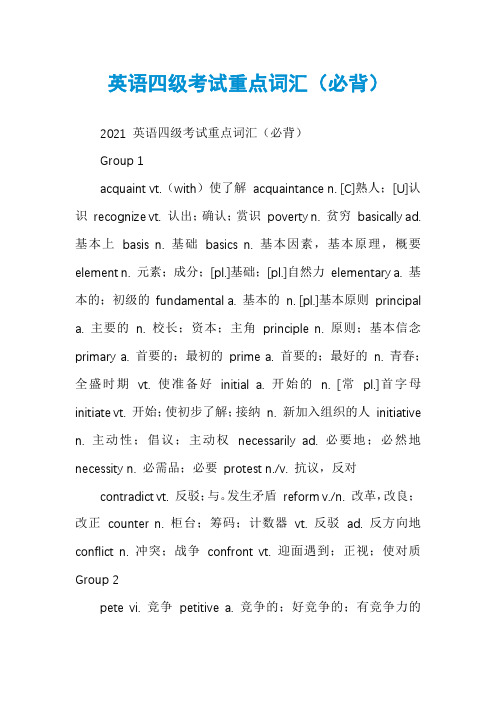
英语四级考试重点词汇(必背)2021 英语四级考试重点词汇(必背)Group 1acquaint vt.(with)使了解acquaintance n. [C]熟人;[U]认识recognize vt. 认出;确认;赏识poverty n. 贫穷basically ad. 基本上basis n. 基础basics n. 基本因素,基本原理,概要element n. 元素;成分;[pl.]基础;[pl.]自然力elementary a. 基本的;初级的fundamental a. 基本的n. [pl.]基本原则principal a. 主要的n. 校长;资本;主角principle n. 原则;基本信念primary a. 首要的;最初的prime a. 首要的;最好的n. 青春;全盛时期vt. 使准备好initial a. 开始的n. [常pl.]首字母initiate vt. 开始;使初步了解;接纳n. 新加入组织的人initiative n. 主动性;倡议;主动权necessarily ad. 必要地;必然地necessity n. 必需品;必要protest n./v. 抗议,反对contradict vt. 反驳;与。
发生矛盾reform v./n. 改革,改良;改正counter n. 柜台;筹码;计数器vt. 反驳ad. 反方向地conflict n. 冲突;战争confront vt. 迎面遇到;正视;使对质Group 2pete vi. 竞争petitive a. 竞争的;好竞争的;有竞争力的fierce a. 凶猛的;狂热的;猛烈的capitalize v. 用大写字母写;为。
提供资金conference n. 会议;商谈participate vi.(in)参加spectator n. 观众,旁观者view n. 看法;观察;景色vt. 看待onlooker n. 旁观者audience n. 听众,观众observe vt. 注意到;观察;评说;遵守performance n. 表演;履行;表现skim vt. 撇;掠过;浏览vi. 略读scan vt. 细看;扫描;浏览n. 扫描overlook vt. 忽略;宽恕;俯瞰glimpse vt./n. 一瞥glare vi.(at)怒视;发出刺眼的光线n.强光;怒视;炫耀gleam vi./n. 闪亮;(with)闪现,流露glitter vi. 闪耀n. 闪光;辉煌glow n. 光亮;脸红;激情vi. 灼热;(脸)红;洋溢glimmer v. 发出闪烁的微光n. 微光,微弱的闪光prominent a. 突出的;突起的outstanding a. 杰出的;未解决的eminent a. 卓越的excel vi.(at, in)突出vt. 胜过Group 3 proficient a. 熟练的,精通的conspicuous a. 显眼的noticeable a. 显而易见的remark vt. 说vi.(on)评论n. 评论insult vt./n. 侮辱detail n. 细节;枝节vt. 详述;列举ment n. 评论;闲话vt. 评论react vi. 反应;(against)反对;(with)起化学反应;(on,upon)影响reaction n. 反应,反作用;(against)反动impress vt. 给。
- 1、下载文档前请自行甄别文档内容的完整性,平台不提供额外的编辑、内容补充、找答案等附加服务。
- 2、"仅部分预览"的文档,不可在线预览部分如存在完整性等问题,可反馈申请退款(可完整预览的文档不适用该条件!)。
- 3、如文档侵犯您的权益,请联系客服反馈,我们会尽快为您处理(人工客服工作时间:9:00-18:30)。
XX英语四级考试词组(一)名词类
大学英语四级词汇与语法和完形填空题以考查各类词组和固定搭配为重点,这些词组和搭配在阅读理解、翻译和写作中也有重要作用,所以这里将各类词组以词性为中心加以分类,以便帮助大家学习和记忆。
这些词组和固定搭配不仅在四、六级考试中至关重要,研究生入学英语考试中它们也是考查重点。
一、名词词组和固定搭配 1.介词+名词 by aident 偶然 on aount of 因为,由于,为了……的缘故 in addition to 另外,加之 in addition 除…之外(还) in the air 流传中 on (the/an) average 按平均值,通常on the basis of 根据,在…的基础上 at best 充其量,至多 for the better 好转,向好的方向发展 on board 在船(车或飞机)上out of breath 喘不过气来 on business 因公,因事 in any case 无论如何,不管怎样 in case of 假如,如果发生;防备 in case 假使,以防(万一) in no case 决不,无论如何不 by chan ___ 偶然,碰巧 in charge (of) 负责,管理 (a)round the lock 日夜不停地 in mon 共用的,共有的 in conclusion 最后,总之 on condition (that) 如果 in consequen ___ of 由于…的缘故,因为 on the contrary 正相反 in contrast with/to 与…对比起来,与…形成对比 out of control 失去控制 under control 处于控制之下 at all cots 不惜任何代价,无论如何 at the cost of 以…为代价 in the course of 在…过程中,在…期间 of course 当然,自然 in danger 在危险中,垂危 out of danger 脱离危险
out of date 过时的,不用的 up to date 现代化的,切合目前情况的 in de ___nd 非常需要的,受欢迎的 in debt 欠债,负债 in detail 详细他 in difficulties 处境困难 in the distan ___ 在远处 off duty 下了班(的),不在值班(的) on duty 在上班(的),在值班(的) on earth 究竟,到底 at all events 无论如何,不管怎样 in any event 无论如何,不管怎样 in the event of 万一,倘若 for example 例如 in the fa ___ of 在…面前;不顾 in fact 其实,实际上 in favo(u)r of 赞同,支持 on fire 着火,起火 on foot 步行 in for ___ 生效,有效;在实施中;大量的
in front of 在…面前,在…前面 in future 今后,从今以后 in the future 在将来 in general 一般说来,大体上 on (one's) guard 警惕,提防;站岗,值班 in half 成两半 at hand 近在手边,在附近 by hand 用手,用体力 hand down 把…传下去 hand in hand 手拉手;密切关联地,同时并进地 in hand (工作等)在进行中;在控制中 on hand 在手边,在近处 on (the) one hand 一方面 on the other hand 另一方面 at heart 内心里,本质上 by heart 凭记性 at home 在家,在国内;舒适,无拘束;熟悉,精通in hono(u)r of 为纪念,为了向…表示敬意 on/upon one's hono(u)r 以名誉 ___ in a hurry 匆忙,急于 for instan ___ 例如;比如 at intervals 不时,每隔一段时间(或距离) at (long) last 终于 at least 至少 at length 终于,最终;详细地 in (the) light of 鉴于,由于 2.动词+名词 have/gain aess to
可以获得 take…into aount 考虑到,顾及,体谅 take advantage of 占…的便宜,利用 pave the way (for) 铺平道路,为…作准备pay attention to 注意 do/try one's best 尽力,努力 get/have the best of 战胜 ___ke the best of 充分利用 get/have the better of 战胜,在…中占上风 catch one's breath 屏息;喘气,气喘;歇口气 take care 注意,当心 take care of 爱护,照料 take a chan ___ 冒险,投机 take charge 开始管理,接管keep…pany 陪伴 take (a) delight in 以…为乐 ___ke a differen ___ 有影响,起(重要)作用 carry/bring/put into effect 使生效,实行,实现 e/go into effect 生效,实施 take effect 生效,起作用 catch ___'s eye 被某人看到,引起某人注意 keep an eye on 留神,照看,密切注意 ___ke a fa ___ 做鬼脸 find fault with 抱怨,挑剔,找岔子 catch (on) fire 着火,开始燃烧 ___ke fiends (with) 与(…)交朋友 be friends with 与…友好 ___ke fun of 取笑,拿…开玩笑 keep ___'s head 保持镇静 in the world 究竟,到底 lose ___'s head 慌乱,仓皇失措 lose heart 丧失勇气,失去信心 get/catch/take hold of 抓住,得到 keep house 管理家务 throw/cast light on/upon 使人了解,阐明 bear/keep in mind 记住 have in mind 考虑到,想到 ___ke up one's mind 下定决心,打定主意 bring/put into operation 实施,使生效,使运行 e/go into operation 施行,实行,生效 keep pa ___ (with) 与(…)齐步前进,与(…)并
驾齐驱 play a part (in) 起作用,参与,扮演角色 take pla ___ 发生,进行, ___ take the pla ___ of 代替,取代 put into practi ___ 实施,实行 ___ke progress 进步,进展 give rise to 引起,导致为…的原因 ___ke sense 讲得通,有意义,言之有理 catch sight of 发现,突然看见 (go) on the stage 当演员take one's time 不着急,不慌忙 keep track of 与…保持 ___ lose track of 失去与…的 ___,不能跟上…的进展 ___ke use of 利用 put to use 使用 give way 让路;屈服,让步;倒塌,坍陷___ke one's way 前往,行进,去 ___ke way 让路,腾出地方或位置
3.名词词组的其他形式 appeal to 呼吁,恳求 attempt at 企图,努力 attitude to/towards 态度,看法 a great/good deal of 大量,非常,极其 influen ___ in 干涉,介入 interferen ___ with 妨碍,打扰 introduction to 介绍 a lot (of) 许多(的),大量(的) lots of 大量,许多 fall in love (with
___) 爱上(某人) reply to 回答,答复 trolley bus 电车 I.D. card ___ credit card ___ no doubt 无疑地,很可能 next door 隔壁 out of doors 在户外 fa ___ to fa ___ 面对面地 a few 有些,几个 quite a few 不少,相当多 a little 一点,一些
little by little 逐渐地,一点点地 quite a little 相当多,不少 no ___tter 无论 the moment (that) 一…(就) no more 不再
fair play 公平竞赛,公平对待 rest room 厕所,盥洗室 pri ___ry school 小学 side by side 肩并肩地,一起 heart and soul 全心全意 step by step 逐步地 ahead of time 提前 all the time 一直,始终 on ___ upon a time 从前 on ___ in a while 偶尔 no wonder 难怪,并不奇怪 word for word 逐字地decline with thanks 婉言谢绝
模板,内容仅供参考。
